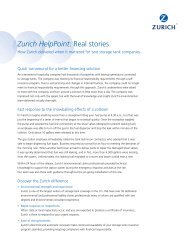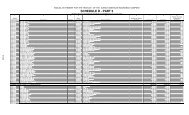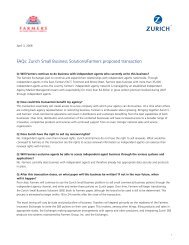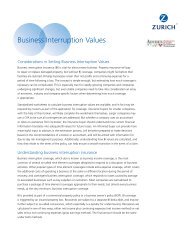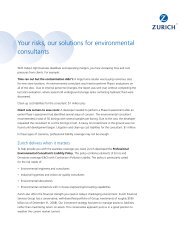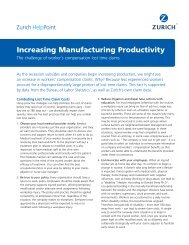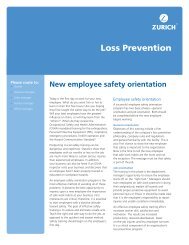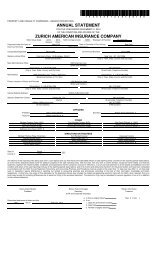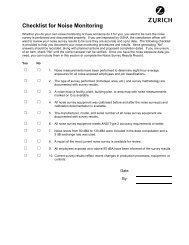Know the risks - Zurich
Know the risks - Zurich
Know the risks - Zurich
Create successful ePaper yourself
Turn your PDF publications into a flip-book with our unique Google optimized e-Paper software.
not impose a self-insured retention with respect to non-indemnified loss incurred by<strong>the</strong> directors and officers under “Side-A.”A D&O policy will have a fixed policy limit. If <strong>the</strong> term of <strong>the</strong> policy is one year, <strong>the</strong>limit of liability will typically be an aggregate limit of liability applicable to all claimsmade during <strong>the</strong> term of <strong>the</strong> policy. If <strong>the</strong> term of <strong>the</strong> policy is two years or more,<strong>the</strong>re may be separate limits of liability for each policy year.3. Definition of “loss”The definition of “loss” generally includes amounts that <strong>the</strong> directors and officersare legally obligated to pay as <strong>the</strong> result of a claim, including damages, judgments,settlements and costs, charges and expenses (excluding salaries of officers oremployees of <strong>the</strong> institution), incurred in <strong>the</strong> defense of <strong>the</strong> claim and appeals.Fines and penalties are generally excluded, as are matters uninsurable under <strong>the</strong>law pursuant to which <strong>the</strong> policy is construed. Punitive and exemplary damagesmay or may not be covered, depending on <strong>the</strong> policy and <strong>the</strong> state in which <strong>the</strong>policy is construed.“Virtually all D&O policiesexclude claims against <strong>the</strong>insureds based upon orattributable to <strong>the</strong>ir gainingin fact any personal profit oradvantage to which <strong>the</strong>y werenot legally entitled.”4. Definition of “wrongful act”The term “wrongful act” is usually defined as any actual or alleged error,misstatement, misleading statement, act or omission or neglect or breach of dutyby <strong>the</strong> directors and officers or any matter claimed against <strong>the</strong>m by reason of <strong>the</strong>irbeing directors or officers of <strong>the</strong> institution or its subsidiaries. If coverage is availablefor <strong>the</strong> institution’s liability to third parties for its own alleged misconduct, <strong>the</strong>definition of “wrongful act” will also include those actual or alleged acts, errors oromissions by <strong>the</strong> institution for which <strong>the</strong> policy provides coverage.Unless o<strong>the</strong>rwise provided in <strong>the</strong> policy, coverage is only available for directors andofficers in <strong>the</strong>ir capacity as directors and officers of <strong>the</strong> institution to which <strong>the</strong> policywas issued. Coverage is not available for wrongdoing committed by <strong>the</strong> directors andofficers in <strong>the</strong>ir personal capacities or as directors or officers of any o<strong>the</strong>r company.5. ExclusionsAll D&O policies contain specific exclusions that fur<strong>the</strong>r define <strong>the</strong> scope of coverageafforded by <strong>the</strong> policy. Some exclusions are included to prevent an overlap ofcoverage with o<strong>the</strong>r forms of insurance available. O<strong>the</strong>rs are included because<strong>the</strong> exposure is not considered to be insurable. There are a number of what areconsidered “standard” exclusions in D&O policies. For example, virtually all D&Opolicies exclude claims against <strong>the</strong> insureds based upon or attributable to <strong>the</strong>irgaining in fact any personal profit or advantage to which <strong>the</strong>y were not legallyentitled. This would limit coverage in connection with cases where <strong>the</strong> directors orofficers are held liable for self-dealing or breaches of <strong>the</strong> duty of loyalty. Most D&Opolicies also exclude claims brought about or contributed to by <strong>the</strong> dishonesty orfraud of <strong>the</strong> insureds. D&O policies usually exclude claims brought by one insuredor <strong>the</strong> institution against ano<strong>the</strong>r insured, except in certain limited circumstances. Inaddition, D&O policies usually exclude claims made against <strong>the</strong> directors and officersfor bodily injury or property damage, or violations of ERISA.27Financial institutions guide



